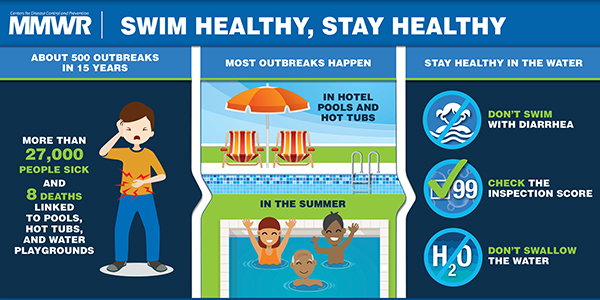Germs in the places we swim can cause a variety of illnesses, including gastrointestinal, skin, ear, respiratory, eye, neurologic, and wound infections. Germs can get into the water in different ways: when they wash off of swimmers’ bodies, when swimmers have diarrheal incidents in the water, and even when rainwater runs off near local beaches and swim areas. Three of the most common germs that cause waterborne illnesses in Virginia are Cryptosporidium, Giardia, and Vibrio.

Prevent recreational water illnesses by following these simple steps.
- Don’t swim when you have diarrhea. Just one diarrheal incident can release enough germs into the water that swallowing a mouthful can cause diarrhea lasting 2-3 weeks.
- Don’t swallow pool water, and don’t drink water directly from streams, lakes, or other bodies of water.
- Practice good hygiene. Shower with soap before swimming and wash your hands with soap after using the toilet or changing diapers. Germs on your body end up in the water.
- Avoid exposing open wounds or cuts to salt or brackish water. If exposed, wash the affected area right away with soap and clean water.
- If you become ill, visit your primary healthcare provider.
Last Updated: September 18, 2024

